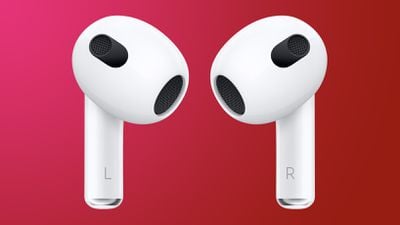Apple in October introduced the redesigned third-generation AirPods, which have an updated design, Adaptive EQ support, spatial audio, and other new features. To explain some of the design decisions Apple made with the AirPods 3, Apple's vice president of acoustics Gary Geaves sat down for an interview with What HiFi (via 9to5Mac), providing some interesting insight into the limitations of Bluetooth and the feature set of the AirPods 3.

According to Geaves, AirPods 3 were built entirely with custom-made components, using nothing "off the shelf." Apple is using a "complicated acoustic system," "carefully tuned bass port," and a "brand new, custom amplifier" all in the name of the best possible sound quality. Apple can optimize for sound with hardware components, but as What HiFi points out, Bluetooth is the real limitation.
When asked if Bluetooth is holding back Apple's hardware and "stifling sound quality," Geaves declined to say too much, but he said that Apple "concentrates very hard" on getting the most out of Bluetooth, and that "it's fair to say" that Apple would "like more bandwidth."
"Obviously the wireless technology is critical for the content delivery that you talk about", he says, "but also things like the amount of latency you get when you move your head, and if that's too long, between you moving your head and the sound changing or remaining static, it will make you feel quite ill, so we have to concentrate very hard on squeezing the most that we can out of the Bluetooth technology, and there's a number of tricks we can play to maximise or get around some of the limits of Bluetooth. But it's fair to say that we would like more bandwidth and... I'll stop right there. We would like more bandwidth", he smiles.
When conceptualizing the AirPods 3, Geaves said that the AirPods team "looked very closely" at the strengths of the second-generation AirPods. The "effortless open fit" that doesn't create a seal in the ear is a big draw of the AirPods, but designing around the lack of a seal "creates challenges for the audio team."
Because no two ears are the same, Geaves said that the sound people experience will be "significantly different, especially the bass," which is what led Apple's AirPods team to add Adaptive EQ, an AirPods Pro feature, to the AirPods 3. It's designed to provide a "consistent frequency response regardless of the level of fit that each person gets."
When designing audio hardware, Apple works from a "strong analytic foundation" and has done "extensive measurements" and "deep statistical research" to inform an "internal acoustic analytic response" that's taken into account. Geaves says that Apple also understands that listening to music "is an emotional experience which people connect with on a very deep level," so Apple works with an "expert team of critical listeners and tuners" as well. The team is from the pro audio industry, and refines the sound for each product, including the new AirPods 3.
The full interview with Geaves goes into more detail on the AirPods 3 and it's well worth a read for those interested.























